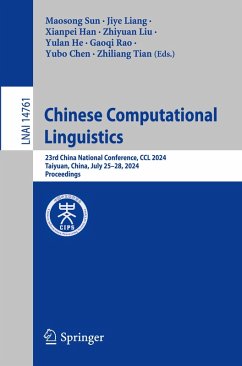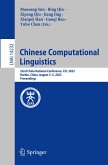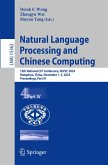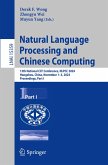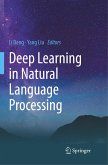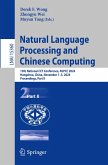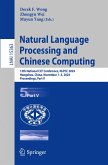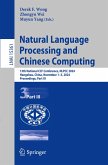Chinese Computational Linguistics
23rd China National Conference, CCL 2024, Taiyuan, China, July 25-28, 2024, Proceedings
Herausgegeben:Sun, Maosong; Liang, Jiye; Han, Xianpei; Liu, Zhiyuan; He, Yulan; Rao, Gaoqi; Chen, Yubo; Tian, Zhiliang
Chinese Computational Linguistics
23rd China National Conference, CCL 2024, Taiyuan, China, July 25-28, 2024, Proceedings
Herausgegeben:Sun, Maosong; Liang, Jiye; Han, Xianpei; Liu, Zhiyuan; He, Yulan; Rao, Gaoqi; Chen, Yubo; Tian, Zhiliang
- Broschiertes Buch
- Merkliste
- Auf die Merkliste
- Bewerten Bewerten
- Teilen
- Produkt teilen
- Produkterinnerung
- Produkterinnerung
This book constitutes the refereed proceedings of the 23rd China National Conference on Chinese Computational Linguistics, CCL 2024, held in Taiyuan, China, during July 25-28, 2024.
The 34 full papers included in this book were carefully reviewed and selected from 320 submissions. They were organized in topical sections as follows: Information Retrieval, Text Classification and QA; Text Generation, Dialogue and Summarization; Machine Translation and Multilingual Information Processing; Knowledge Graph and Information Extraction; Social Computing and Sentiment Analysis; NLP Applications;…mehr
Andere Kunden interessierten sich auch für
![Chinese Computational Linguistics Chinese Computational Linguistics]() Chinese Computational Linguistics60,99 €
Chinese Computational Linguistics60,99 €![Natural Language Processing and Chinese Computing Natural Language Processing and Chinese Computing]() Natural Language Processing and Chinese Computing61,99 €
Natural Language Processing and Chinese Computing61,99 €![Natural Language Processing and Chinese Computing Natural Language Processing and Chinese Computing]() Natural Language Processing and Chinese Computing61,99 €
Natural Language Processing and Chinese Computing61,99 €![Deep Learning in Natural Language Processing Deep Learning in Natural Language Processing]() Deep Learning in Natural Language Processing127,99 €
Deep Learning in Natural Language Processing127,99 €![Natural Language Processing and Chinese Computing Natural Language Processing and Chinese Computing]() Natural Language Processing and Chinese Computing55,99 €
Natural Language Processing and Chinese Computing55,99 €![Natural Language Processing and Chinese Computing Natural Language Processing and Chinese Computing]() Natural Language Processing and Chinese Computing55,99 €
Natural Language Processing and Chinese Computing55,99 €![Natural Language Processing and Chinese Computing Natural Language Processing and Chinese Computing]() Natural Language Processing and Chinese Computing55,99 €
Natural Language Processing and Chinese Computing55,99 €-
-
-
This book constitutes the refereed proceedings of the 23rd China National Conference on Chinese Computational Linguistics, CCL 2024, held in Taiyuan, China, during July 25-28, 2024.
The 34 full papers included in this book were carefully reviewed and selected from 320 submissions. They were organized in topical sections as follows: Information Retrieval, Text Classification and QA; Text Generation, Dialogue and Summarization; Machine Translation and Multilingual Information Processing; Knowledge Graph and Information Extraction; Social Computing and Sentiment Analysis; NLP Applications; Fundamental Theory and Method of Language Computing and Cognition; Language Resource and Evaluation; and Large Language Models.
The 34 full papers included in this book were carefully reviewed and selected from 320 submissions. They were organized in topical sections as follows: Information Retrieval, Text Classification and QA; Text Generation, Dialogue and Summarization; Machine Translation and Multilingual Information Processing; Knowledge Graph and Information Extraction; Social Computing and Sentiment Analysis; NLP Applications; Fundamental Theory and Method of Language Computing and Cognition; Language Resource and Evaluation; and Large Language Models.
Produktdetails
- Produktdetails
- Lecture Notes in Computer Science 14761
- Verlag: Springer / Springer Nature Singapore / Springer, Berlin
- Artikelnr. des Verlages: 978-981-97-8366-3
- Seitenzahl: 620
- Erscheinungstermin: 29. November 2024
- Englisch
- Abmessung: 235mm x 155mm x 34mm
- Gewicht: 926g
- ISBN-13: 9789819783663
- ISBN-10: 9819783666
- Artikelnr.: 71477455
- Herstellerkennzeichnung Die Herstellerinformationen sind derzeit nicht verfügbar.
- Lecture Notes in Computer Science 14761
- Verlag: Springer / Springer Nature Singapore / Springer, Berlin
- Artikelnr. des Verlages: 978-981-97-8366-3
- Seitenzahl: 620
- Erscheinungstermin: 29. November 2024
- Englisch
- Abmessung: 235mm x 155mm x 34mm
- Gewicht: 926g
- ISBN-13: 9789819783663
- ISBN-10: 9819783666
- Artikelnr.: 71477455
- Herstellerkennzeichnung Die Herstellerinformationen sind derzeit nicht verfügbar.
.- Information Retrieval, Text Classification and QA.
.- Enhancing Free-Form Table Question Answering Models by Distilling Relevant-Cell-Based Rationales.
.- Enhangcing Sequence Representation for Personalized Search.
.- Joint Similarity Guidance Hash Coding Based on Adaptive Weight Mixing Strategy For Cross-Modal Retrieval.
.- Text Generation, Dialogue and Summarization.
.- Generate-then-Revise: An Effective Synthetic Training Data Generation framework for Event Detection.
.- Machine Translation and Multilingual Information Processing.
.- E³: Optimizing Language Model Training for Translation via Enhancing Efficiency and Effectiveness.
.- Multi-features Enhanced Multi-task Learning for Vietnamese Treebank Conversion.
.- SimCLNMT: A Simple Contrastive Learning Method for Enhancing Neural Machine Translation Quality.
.- Translate-and-Revise: Boosting Large Language Models for Constrained Translation.
.- Knowledge Graph and Information Extraction.
.- A Multi-Task Biomedical Named Entity Recognition Method Based on Data Augmentation.
.- Biomedical Event Causal Relation Extraction by Reasoning Optimal Entity Relation Path.
.- Joint Entity and Relation Extraction Based on Bidirectional Update and Long-Term Memory Gate Mechanism.
.- MFE-NER:Multi-feature Fusion Embedding for Chinese Named Entity Recognition.
.- UDAA: An Unsupervised Domain Adaptation Adversarial Learning Framework for Zero-Resource Cross-Domain Named Entity Recognition.
.- Social Computing and Sentiment Analysis.
.- Triple-view Event Hierarchy Model for Biomedical Event Representation.
.- NLP Applications.
.- DialectMoE: An End-to-End Multi-Dialect Speech Recognition Model with Mixture-of-Experts.
.- Distinguishing Neural Speech Synthesis Models Through Fingerprints in Speech Waveforms.
.- Knowledge Graph-Enhanced Recommendation with Box Embeddings.
.- Readability-guided Idiom-aware Sentence Simplification(RISS) for Chinese.
.- Fundamental Theory and Method of Language Computing and Cognition.
.- A Tone-based Hierarchical Structure of Chinese Prosody.
.- Linguistic Guidance for Sequence-to-Sequence AMR Parsing.
.- Language Resource and Evaluation.
.- Automatic Construction of the English Sentence Pattern Structure Treebank for Chinese ESL learners.
.- Cost-efficient Crowdsourcing for Span-based Sequence Labeling:Worker Selection and Data Augmentation.
.- DLUE: Benchmarking Document Language Understanding.
.- Do Large Language Models Understand Conversational Implicature- A case study with a Chinese sitcom.
.- EmoFake: An Initial Dataset for Emotion Fake Audio Detection.
.- Going Beyond Passages:Readability Assessment for Book-level Long Texts.
.- Mitigating the Bias of Large Language Model Evaluation.
.- PPDAC: A Plug-and -Play Data Augmentation Component for Few-shot Extractive Question Answering.
.- Sentence-Space Metrics (SSM) for the Evaluation of Sentence Comprehension.
.- Large Language Models.
.- AuditWen: An Open-Source Large Language Model for Audit.
.- Chinese Grammatical Error Correction via Large Language Model Guided Optimization Training.
.- Pattern Shifting or Knowledge Losing? A Forgetting Perspective for Understanding the Effect of Instruction Fine-Tuning.
.- Prior Constrains-based Reward Model Training for Aligning Large Language Models.
.- Prompt Engineering 101 Prompt Engineering Guidelines from a Linguistic Perspective.
.- Enhancing Free-Form Table Question Answering Models by Distilling Relevant-Cell-Based Rationales.
.- Enhangcing Sequence Representation for Personalized Search.
.- Joint Similarity Guidance Hash Coding Based on Adaptive Weight Mixing Strategy For Cross-Modal Retrieval.
.- Text Generation, Dialogue and Summarization.
.- Generate-then-Revise: An Effective Synthetic Training Data Generation framework for Event Detection.
.- Machine Translation and Multilingual Information Processing.
.- E³: Optimizing Language Model Training for Translation via Enhancing Efficiency and Effectiveness.
.- Multi-features Enhanced Multi-task Learning for Vietnamese Treebank Conversion.
.- SimCLNMT: A Simple Contrastive Learning Method for Enhancing Neural Machine Translation Quality.
.- Translate-and-Revise: Boosting Large Language Models for Constrained Translation.
.- Knowledge Graph and Information Extraction.
.- A Multi-Task Biomedical Named Entity Recognition Method Based on Data Augmentation.
.- Biomedical Event Causal Relation Extraction by Reasoning Optimal Entity Relation Path.
.- Joint Entity and Relation Extraction Based on Bidirectional Update and Long-Term Memory Gate Mechanism.
.- MFE-NER:Multi-feature Fusion Embedding for Chinese Named Entity Recognition.
.- UDAA: An Unsupervised Domain Adaptation Adversarial Learning Framework for Zero-Resource Cross-Domain Named Entity Recognition.
.- Social Computing and Sentiment Analysis.
.- Triple-view Event Hierarchy Model for Biomedical Event Representation.
.- NLP Applications.
.- DialectMoE: An End-to-End Multi-Dialect Speech Recognition Model with Mixture-of-Experts.
.- Distinguishing Neural Speech Synthesis Models Through Fingerprints in Speech Waveforms.
.- Knowledge Graph-Enhanced Recommendation with Box Embeddings.
.- Readability-guided Idiom-aware Sentence Simplification(RISS) for Chinese.
.- Fundamental Theory and Method of Language Computing and Cognition.
.- A Tone-based Hierarchical Structure of Chinese Prosody.
.- Linguistic Guidance for Sequence-to-Sequence AMR Parsing.
.- Language Resource and Evaluation.
.- Automatic Construction of the English Sentence Pattern Structure Treebank for Chinese ESL learners.
.- Cost-efficient Crowdsourcing for Span-based Sequence Labeling:Worker Selection and Data Augmentation.
.- DLUE: Benchmarking Document Language Understanding.
.- Do Large Language Models Understand Conversational Implicature- A case study with a Chinese sitcom.
.- EmoFake: An Initial Dataset for Emotion Fake Audio Detection.
.- Going Beyond Passages:Readability Assessment for Book-level Long Texts.
.- Mitigating the Bias of Large Language Model Evaluation.
.- PPDAC: A Plug-and -Play Data Augmentation Component for Few-shot Extractive Question Answering.
.- Sentence-Space Metrics (SSM) for the Evaluation of Sentence Comprehension.
.- Large Language Models.
.- AuditWen: An Open-Source Large Language Model for Audit.
.- Chinese Grammatical Error Correction via Large Language Model Guided Optimization Training.
.- Pattern Shifting or Knowledge Losing? A Forgetting Perspective for Understanding the Effect of Instruction Fine-Tuning.
.- Prior Constrains-based Reward Model Training for Aligning Large Language Models.
.- Prompt Engineering 101 Prompt Engineering Guidelines from a Linguistic Perspective.
.- Information Retrieval, Text Classification and QA.
.- Enhancing Free-Form Table Question Answering Models by Distilling Relevant-Cell-Based Rationales.
.- Enhangcing Sequence Representation for Personalized Search.
.- Joint Similarity Guidance Hash Coding Based on Adaptive Weight Mixing Strategy For Cross-Modal Retrieval.
.- Text Generation, Dialogue and Summarization.
.- Generate-then-Revise: An Effective Synthetic Training Data Generation framework for Event Detection.
.- Machine Translation and Multilingual Information Processing.
.- E³: Optimizing Language Model Training for Translation via Enhancing Efficiency and Effectiveness.
.- Multi-features Enhanced Multi-task Learning for Vietnamese Treebank Conversion.
.- SimCLNMT: A Simple Contrastive Learning Method for Enhancing Neural Machine Translation Quality.
.- Translate-and-Revise: Boosting Large Language Models for Constrained Translation.
.- Knowledge Graph and Information Extraction.
.- A Multi-Task Biomedical Named Entity Recognition Method Based on Data Augmentation.
.- Biomedical Event Causal Relation Extraction by Reasoning Optimal Entity Relation Path.
.- Joint Entity and Relation Extraction Based on Bidirectional Update and Long-Term Memory Gate Mechanism.
.- MFE-NER:Multi-feature Fusion Embedding for Chinese Named Entity Recognition.
.- UDAA: An Unsupervised Domain Adaptation Adversarial Learning Framework for Zero-Resource Cross-Domain Named Entity Recognition.
.- Social Computing and Sentiment Analysis.
.- Triple-view Event Hierarchy Model for Biomedical Event Representation.
.- NLP Applications.
.- DialectMoE: An End-to-End Multi-Dialect Speech Recognition Model with Mixture-of-Experts.
.- Distinguishing Neural Speech Synthesis Models Through Fingerprints in Speech Waveforms.
.- Knowledge Graph-Enhanced Recommendation with Box Embeddings.
.- Readability-guided Idiom-aware Sentence Simplification(RISS) for Chinese.
.- Fundamental Theory and Method of Language Computing and Cognition.
.- A Tone-based Hierarchical Structure of Chinese Prosody.
.- Linguistic Guidance for Sequence-to-Sequence AMR Parsing.
.- Language Resource and Evaluation.
.- Automatic Construction of the English Sentence Pattern Structure Treebank for Chinese ESL learners.
.- Cost-efficient Crowdsourcing for Span-based Sequence Labeling:Worker Selection and Data Augmentation.
.- DLUE: Benchmarking Document Language Understanding.
.- Do Large Language Models Understand Conversational Implicature- A case study with a Chinese sitcom.
.- EmoFake: An Initial Dataset for Emotion Fake Audio Detection.
.- Going Beyond Passages:Readability Assessment for Book-level Long Texts.
.- Mitigating the Bias of Large Language Model Evaluation.
.- PPDAC: A Plug-and -Play Data Augmentation Component for Few-shot Extractive Question Answering.
.- Sentence-Space Metrics (SSM) for the Evaluation of Sentence Comprehension.
.- Large Language Models.
.- AuditWen: An Open-Source Large Language Model for Audit.
.- Chinese Grammatical Error Correction via Large Language Model Guided Optimization Training.
.- Pattern Shifting or Knowledge Losing? A Forgetting Perspective for Understanding the Effect of Instruction Fine-Tuning.
.- Prior Constrains-based Reward Model Training for Aligning Large Language Models.
.- Prompt Engineering 101 Prompt Engineering Guidelines from a Linguistic Perspective.
.- Enhancing Free-Form Table Question Answering Models by Distilling Relevant-Cell-Based Rationales.
.- Enhangcing Sequence Representation for Personalized Search.
.- Joint Similarity Guidance Hash Coding Based on Adaptive Weight Mixing Strategy For Cross-Modal Retrieval.
.- Text Generation, Dialogue and Summarization.
.- Generate-then-Revise: An Effective Synthetic Training Data Generation framework for Event Detection.
.- Machine Translation and Multilingual Information Processing.
.- E³: Optimizing Language Model Training for Translation via Enhancing Efficiency and Effectiveness.
.- Multi-features Enhanced Multi-task Learning for Vietnamese Treebank Conversion.
.- SimCLNMT: A Simple Contrastive Learning Method for Enhancing Neural Machine Translation Quality.
.- Translate-and-Revise: Boosting Large Language Models for Constrained Translation.
.- Knowledge Graph and Information Extraction.
.- A Multi-Task Biomedical Named Entity Recognition Method Based on Data Augmentation.
.- Biomedical Event Causal Relation Extraction by Reasoning Optimal Entity Relation Path.
.- Joint Entity and Relation Extraction Based on Bidirectional Update and Long-Term Memory Gate Mechanism.
.- MFE-NER:Multi-feature Fusion Embedding for Chinese Named Entity Recognition.
.- UDAA: An Unsupervised Domain Adaptation Adversarial Learning Framework for Zero-Resource Cross-Domain Named Entity Recognition.
.- Social Computing and Sentiment Analysis.
.- Triple-view Event Hierarchy Model for Biomedical Event Representation.
.- NLP Applications.
.- DialectMoE: An End-to-End Multi-Dialect Speech Recognition Model with Mixture-of-Experts.
.- Distinguishing Neural Speech Synthesis Models Through Fingerprints in Speech Waveforms.
.- Knowledge Graph-Enhanced Recommendation with Box Embeddings.
.- Readability-guided Idiom-aware Sentence Simplification(RISS) for Chinese.
.- Fundamental Theory and Method of Language Computing and Cognition.
.- A Tone-based Hierarchical Structure of Chinese Prosody.
.- Linguistic Guidance for Sequence-to-Sequence AMR Parsing.
.- Language Resource and Evaluation.
.- Automatic Construction of the English Sentence Pattern Structure Treebank for Chinese ESL learners.
.- Cost-efficient Crowdsourcing for Span-based Sequence Labeling:Worker Selection and Data Augmentation.
.- DLUE: Benchmarking Document Language Understanding.
.- Do Large Language Models Understand Conversational Implicature- A case study with a Chinese sitcom.
.- EmoFake: An Initial Dataset for Emotion Fake Audio Detection.
.- Going Beyond Passages:Readability Assessment for Book-level Long Texts.
.- Mitigating the Bias of Large Language Model Evaluation.
.- PPDAC: A Plug-and -Play Data Augmentation Component for Few-shot Extractive Question Answering.
.- Sentence-Space Metrics (SSM) for the Evaluation of Sentence Comprehension.
.- Large Language Models.
.- AuditWen: An Open-Source Large Language Model for Audit.
.- Chinese Grammatical Error Correction via Large Language Model Guided Optimization Training.
.- Pattern Shifting or Knowledge Losing? A Forgetting Perspective for Understanding the Effect of Instruction Fine-Tuning.
.- Prior Constrains-based Reward Model Training for Aligning Large Language Models.
.- Prompt Engineering 101 Prompt Engineering Guidelines from a Linguistic Perspective.

